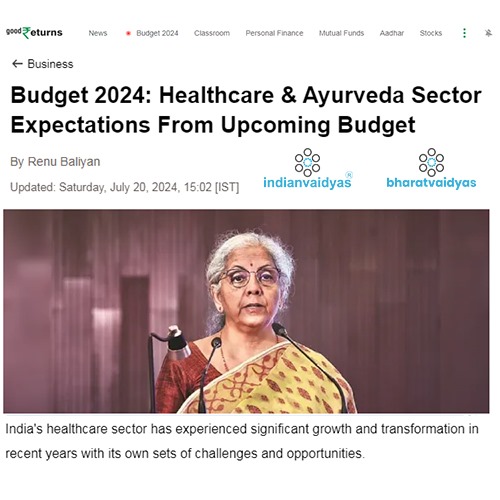Budget 2024: Healthcare & Ayurveda Sector Expectations From Upcoming Budget
23-Jul-24 05:06:00

India's healthcare sector has experienced significant growth and transformation in recent years with its own sets of challenges and opportunities. The healthcare sector, incorporating modern medical practices and technologies, always aims to deliver comprehensive and accessible care to India's diverse population. Additionally, Ayurveda, which is strongly rooted in the country's cultural heritage, has gained global recognition for its holistic approach to health and wellness. As India prepares for its upcoming union budget, the healthcare and Ayurveda sectors are eagerly anticipating measures that will introduce new initiatives and allocate more funds to further enhance these sectors' capabilities and reach.
In the 2024-25 Interim Budget, the government allocated Rs 3,712.49 crore for the Ayush Ministry. It is a 23.74% increase since last year's budget allocation. This significant increase showcases the government's recognition of the potential of AYUSH to contribute to both national health and economic growth, according to Mr. Shrawan Daga, CEO of Krishna's Herbal & Ayurveda.
Additionally, the interim budget also allocated Rs 14.63 crore to the National Medicinal Plants Board and Rs 20.80 crore to the Pharmacopoeia Commission for Indian Medicine and Homoeopathy. These investments are commendable steps towards strengthening the sector, but there are calls for even more robust investments in research and development, infrastructure, and education within the Ayurveda sector, added Shrawan Daga.
Expanding on the need for increased funding, the global market for Ayurvedic products is growing rapidly. Countries around the world are increasingly recognizing the benefits of traditional medicine and holistic health approaches. Therefore, we anticipate the 2024 union budget to focus on the registration and promotion of AYUSH products internationally. This will help India position itself as a leader in holistic health and wellness. Also, this will open up new opportunities and markets for Indian exporters and will enhance the credibility and acceptance of AYUSH products all across the globe.
Furthermore, many industry experts from the Indian healthcare industry expect to see enhanced research and development within the Ayush sector. Modernizing Ayurvedic practices and integrating them with contemporary scientific research can lead to more effective treatments and increased global acceptance. Therefore, the government should prioritize investing in research and development that will not only support the creation of high-quality products to meet global standards but will also boost exports and establish India as a hub for Ayurvedic excellence, emphasized Shrawan Daga.
Apart from this, some recent reports claim that this year's budget is also expected to include steps to fast-track reforms aimed at making India a USD 5-trillion economy soon and transforming the country into a 'Viksit Bharat' by 2047. This ambitious vision aligns with the broader goals of enhancing healthcare infrastructure, promoting innovation, and ensuring inclusive growth across all sectors.
Lastly, the healthcare sector expects the union budget to offer health insurance to employees at negotiated rates, reducing GST on health insurance premiums, and providing tax benefits like increased Section 80D exemption limits would significantly benefit the 'missing middle' segment of our population. These measures would ensure that more individuals can afford health insurance, leading to better health outcomes and financial security for many families, stated Shrawan Daga. As Ayurveda goes global, the need for clinical trials studies for ayurvedic medicines are also increasing. We expect the government to provide necessary subsidies to the ayurvedic medicine manufacturers for getting the clinical trials done. This will enhance Indian products' acceptance and credibility in the global market.
SOURCE & CREDIT: GOOD RETURNS